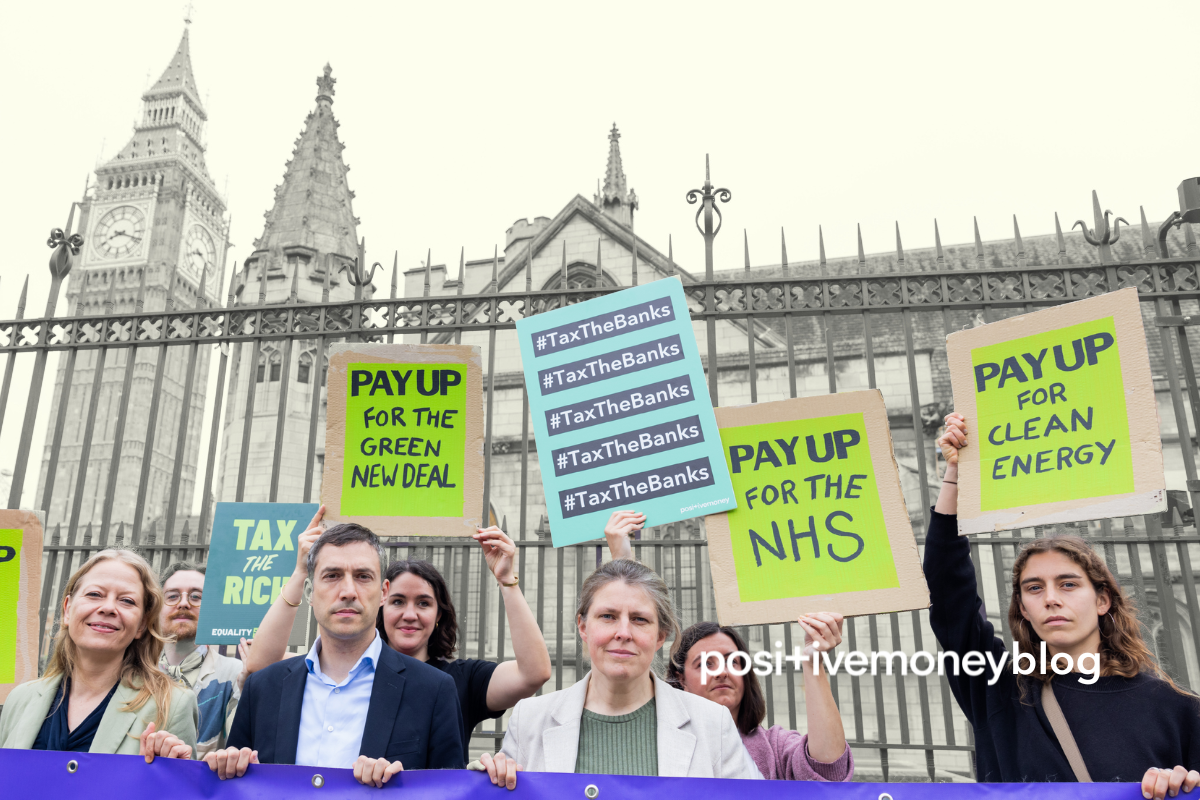
UKGlobal
27 January 2026
Rachel Reeves’ Spending Review means damaging cuts to vital public services but it doesn’t have to be this way. Wealth taxes, including a tax on banks, in the Autumn Budget later this year, could reverse the damage.
On Wednesday 11th June, Chancellor Rachel Reeves shared her Comprehensive Spending Review in Parliament, setting out the government’s spending plans for the next three years.
Much of the media’s focus was on which departments were the winners and losers, but it didn’t have to be this way. So we headed to Parliament Square in the morning to make an alternative clear: tax extreme wealth. And the best place to start? A tax on banks.
Yesterday wasn’t - to use the proper Westminster jargon - a ‘fiscal event’. It didn’t change any taxes (that chance will come later this year in the Autumn Budget) but in cutting up the public spending pie, the spending review is a clear sign of where this government’s priorities lie and where they don’t.
Many thanks to Green New Deal Rising and photographer Milo Chandler for the photo.
The recent U-turn on pensioner’s winter fuel payments, record investment in affordable and social housing and expansion of free school meals are very welcome, but there are still horrific cuts coming down the pipeline. Cuts to international aid, disability benefits and more, and by keeping the two-child benefit cap this government will push a quarter of a million more people, including 50,000 children in the UK, into poverty. But there is an alternative.
As our Head of Economics, Danisha Kazi, who joined BBC Radio London on the day, made clear: “we could be taxing wealth and the windfall profits of banks and corporations during the cost of living crisis to ease the government’s finances.”
Momentum is building. Increasing the bank surcharge was one item on MP and Deputy Prime Minister Angela Rayner’s list of proposals to raise revenue that was leaked to the Daily Telegraph. It raised by ex-Chancellor and Prime Minister Gordon Brown in The Guardian, in an interview with the New Statesman, and he cited our bank profit figures in his new plan to tackle child poverty.
Spending cuts are a choice and right now, this government is choosing to protect extreme wealth at the cost of people’s lives. That’s why we joined Green New Deal Rising, Tax Justice UK, The Equality Trust, and dozens more civil society organisations, campaign groups and MPs including Sian Berry, Adrian Ramsay, and Rachael Maskell, yesterday to amplify our voices and send a message to the Chancellor: it’s time to make different choices.
A tax on banks isn’t a silver bullet. We need to rewrite the fiscal rules and redo the monetary policy framework to ramp up public investment in our hospitals and schools at the very least - but it’s a start. A start that would prove this government isn’t in the pocket of big donors and corporate lobbyists, and signal the kind of change they promised to deliver.
That’s why we’re also building a pot of funds to focus on making a tax on banks a reality in this year’s Autumn Budget. We know it’s possible because momentum is building. Ex-Chancellor and Prime Minister Gordon Brown cited our bank profit figures in his new plan to tackle child poverty, and the need is dire; new figures released this week find almost half of UK adults are living in financial insecurity - up nearly 20% from just 10 years ago.
The numbers make sense. A windfall tax on big bank profits could bring in almost £15 billion - nearly *three times* more than slashing disability benefits. But we need more than numbers to convince the Chancellor, we need to get louder, grab more headlines, reach more people, and keep building momentum for wealth taxes. The action outside Westminster resulted in press coverage from Yahoo Finance, The Guardian’s livefeed and PoliticsJoe - but we need to spread our message much further.
The big banks have got deep pockets and an army of highly-paid lobbyists. They already tried to push Rachel Reeves into slashing the cap on cash-free ISAs earlier this year - but we pushed back. And we can do it again.
If you haven’t already, join over 6,500 others and add your digital signature to the #TaxTheBanks petition, or if you can, please chip in to our crowdfunder to help make a tax on banks a reality in this year’s Autumn Budget.
